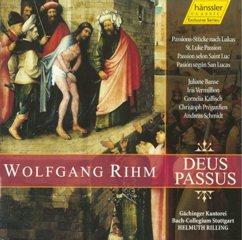Wolfgang Rihm - Deus Passus: St. Luke Passion (2001)
Wolfgang Rihm - Deus Passus: St. Luke Passion (2001)

CD1 01 Das ist mein Leib 02 Potum meum 03 Instrumentalsatz 04 Und er ging hinaus 05 Domine, audivi auditum tuum 06 Siehe, da kam die Schar 07 Eripe me, Domine 08 Sie griffen ihn aber 09 Die Manner aber,die Jesum hielten - Weissage, wer ist's 10 Qui cogitaverunt malitias in corde 11 Und als es Tag ward 12 Und sie fuhrten ihn vor Pilatus 13 Da aber Herodes Jesum sah 14 Pilatus aber sprach 15 Poplue meus 16 Und als sie ihn hinfuhrten - Ihr Tochter von Jerusalem - Es wurden aber auch ... CD2 01 Und als sie kamen an die Statte 02 Crux fidelis 03 Er hat anderen geholfen 04 Hic acetum, fel, arundo 05 Es war aber auch uber ihm geschrieben - Und es ward eine Finsternis 06 Und Jesus rief laut - Vater, ich befehle meinen Geist - Und ... verschied 07 Flecte ramos, arbor alta 08 Stabat mater dolorosa 09 Und alles Volk, das dabei war - Furwahr, er trug unsre Krankheit 10 Joseph von Arimathia ging zu Pilatus 11 Tenebrae Juliane Banse, soprano Iris Vermillion, mezzo-soprano Cornelia Kallisch, alto Christoph Pregardien, tenor Andreas Schmidt, baritone Gächinger Kantorei Bach-Collegium Stuttgart Helmuth Rilling, conductor
"The blood in the formula of institution...'meets' the blood of slaughtered humanity. The attempt to give form to something so unspeakable could be said to characterize the entire work, and reserve to be its defining quality." -- Wolfgang Rihm on his Deus Passus
Some stories we tell, and some stories tell us: they flow beneath a conscious fabling, undercut our narrative thread and press against our sounding voice like an insidious double. In his setting of the Passion of Christ according to Luke, Wolfgang Rihm consciously commits himself not to one but two stories. The first is the tale of Christ's persecution and crucifixion, probably the the West's longest-lasting thread, unbroken through millennia of retellings. But the second substory which Rihm attempts in his Passion is a comparatively recent one, perhaps (in some minds) a revision of Christian narrative. It's the "story" of the Holocaust -- hardly a story, hardly a fable with hardly a moral. When, amidst some of Rihm's oddest and uncomfortable music yet, this counterplot surfaces, the 90-minute Passion is almost over. And even though the score's force and voice have all but faded by this point, the revealing still shocks: just as the women enter the tomb of Christ and find him missing -- this moment which modulates almost immediately among into the Resurrection -- Rihm severs the biblical text's head, and substitutes Frankenstein-like a famous verse ("Tenebrae") of poet Paul Celan, a camp survivor who committed suicide in 1970 -- an inconceivably inverted petition, in this context: "Pray, Lord,/pray to us,/we are near."
Perhaps, somewhere, a tear is always shed for a cut thread; but to snip the trajectory of immanent afterlife, rend the resurrecting moment and replace it with the monstrous swerve of Celan's words -- is an act of poetic violence on Rihm's part, a move to wound the expectations. Why? As a German born after WWII, Rihm sits uneasy with the Passion-form, remarking of his choice to set Luke that it "would have been impossible for a German composer such as myself to use...one of the other Gospels," which contain the stains of anti-Semitism. But Rihm's critique went farther; his Deus Passus, written for the Stuttgart "Passion 2000" project, bears the subtitle "Fragments of a St. Luke Passion." Scored for five solo voices, small orchestra, and chorus, it's a set of immaculate ruins, a collection of gleaming tesserae; its music arises from between the Passion and the Genocide as the reflection of a finely wound filament in a shattered mirror.
Perhaps what's at stake in this cruelest cross-cut is not the collision of one story with another; it's the collision of storytelling with an ineffable lack of story. The Gospels-tales remained intact over epochs but the Holocaust is broken anti-event defying narration through only 60 years. There's a rift, an absent equivalence between these two irreconcilable blood-offerings, a mis-transfusion, possibly a poisoning. In their own shattered doubleness, Rihm's "Passion-pieces" at least catch a chasm's likeness, even if they do not bridge it. ---Seth Brodsky, allmusic.com
download (mp3 @320 kbs):








